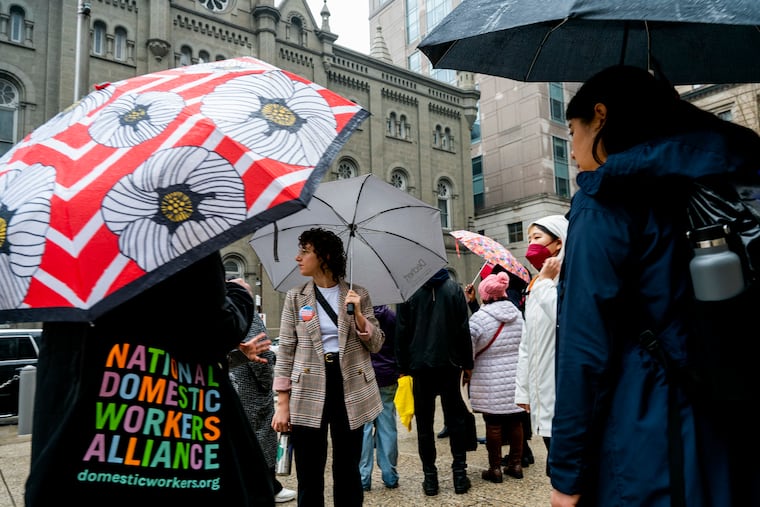What Mayor Cherelle Parker can do for domestic workers
The mayor can’t change the working conditions her grandmother endured decades ago, but she can change them for domestic workers in our city today.

In the coming weeks, Mayor Cherelle L. Parker will put forward her proposed 2025 budget, and City Council members will begin the budgeting process. The budget they will vote on includes funding to enforce new and existing labor rights legislation to benefit domestic workers like me — and like Parker’s grandmother was decades ago.
A lot has changed since Parker’s grandmother cleaned homes for wealthy people, but so much has stayed the same.
There are more than 16,000 domestic workers in Philadelphia: nannies, home-care workers like myself, and house cleaners. We are a workforce that is 84% women and 54% women of color. In 2019, we won the best law in the country to protect domestic workers through Philadelphia’s Domestic Workers Bill of Rights, but there is still little oversight of employers and their treatment of domestic employees. So even though we have rights, they are often not enforced.
We face discrimination, sexual violence, lack of health insurance and other benefits, and poverty wages. Domestic workers are still isolated in the workplace, and employers aren’t held accountable when they retaliate against us for standing up for our rights on the job because the city hasn’t invested enough in the Office of Worker Protections.
I’ve been a domestic worker for 40 years, and this career path comes from my heart. I learned how to be a caregiver as a young girl in order to take care of my sister, who has severe lupus. My first job was as a childcare worker, and later, I became a home health aide for older adults and people with disabilities. I am also a grandmother to 12 grandchildren.
I love this job. But it isn’t easy, and progress is too slow. I can guarantee that a lot of what I have experienced as a domestic worker is what Parker’s grandmother experienced. But it doesn’t have to be that way.
Through the Pennsylvania chapter of the National Domestic Workers Alliance, domestic workers like me have been working on new legislation to protect all workers from retaliation. Right now there’s only one full-time staff member within the Office of Worker Protections for every 197,000 Philadelphians, which means long wait times for workers filing complaints. For our rights to be real, we need a $2.6 million budget for the Office of Worker Protections to make sure all the current labor laws and our upcoming anti-retaliation legislation can truly protect workers from abuse and retaliation.
Here is my appeal to Parker: Imagine when you were a young girl that you could have protected people like your grandmother from being fired in retaliation for asking for full pay or for a written contract. Wouldn’t you have jumped at the opportunity to do that? Imagine if you could have ensured your grandmother didn’t feel afraid to speak up if she was asked to do extra work without pay. Wouldn’t you have done that in a heartbeat? I know my grandchildren would.
The mayor can’t change the working conditions her grandmother endured decades ago, but she can change them for domestic workers in our city today.
I encourage Parker to sign her name to a budget that says people like me deserve to have good jobs, without fear of retaliation from their employers, with the city of Philadelphia having our back.
Arnetta Anderson has worked as a domestic worker and caregiver in Philadelphia for 40 years. She’s a member of the National Domestic Workers Alliance — Pennsylvania chapter, an organization that works for labor rights, respect, and justice for caregivers, nannies, and house cleaners.